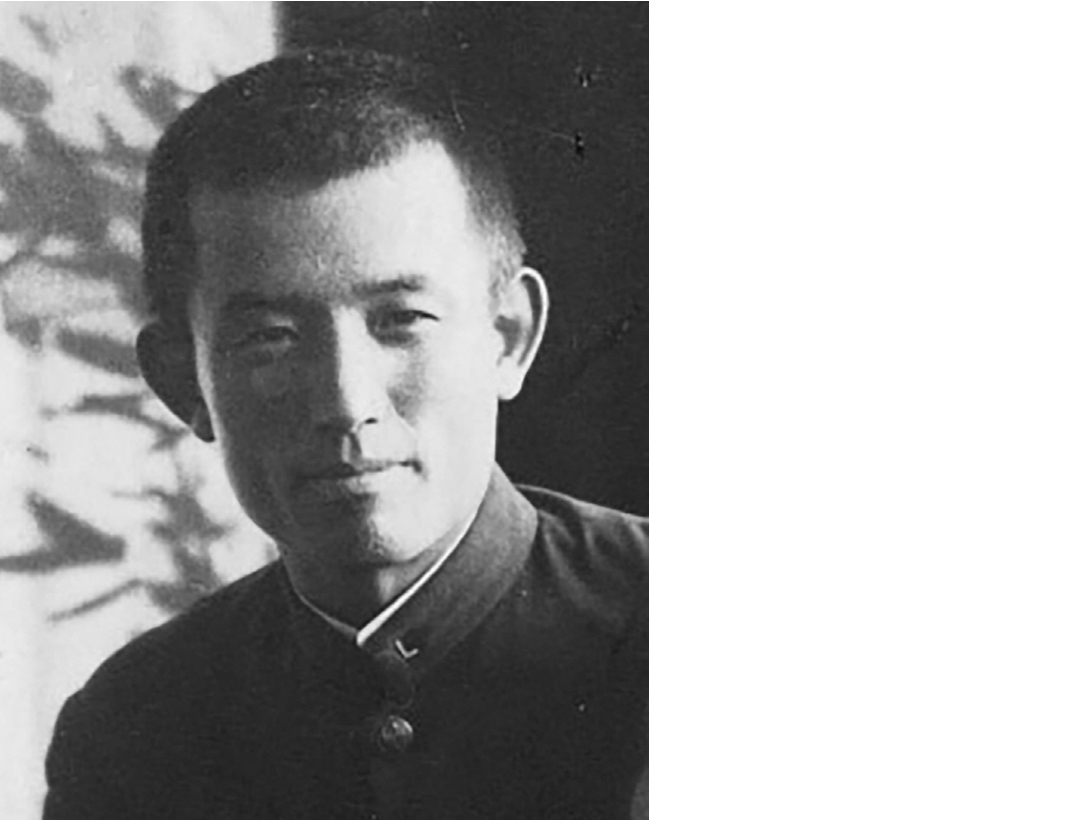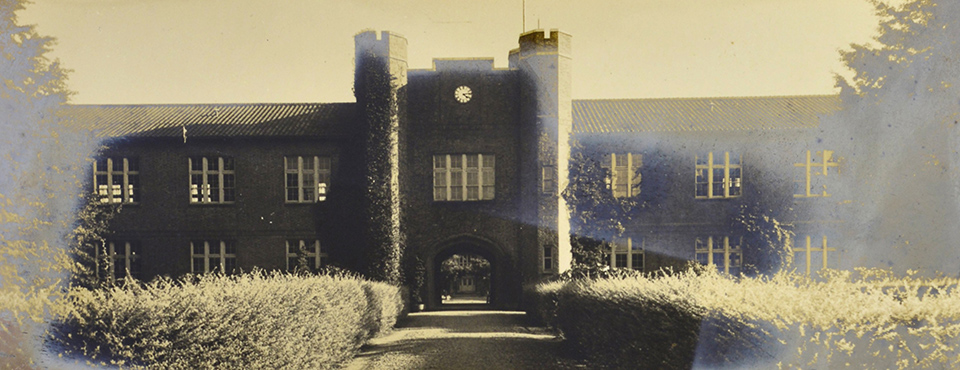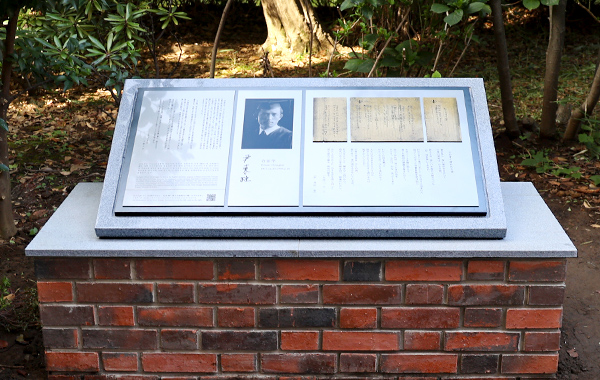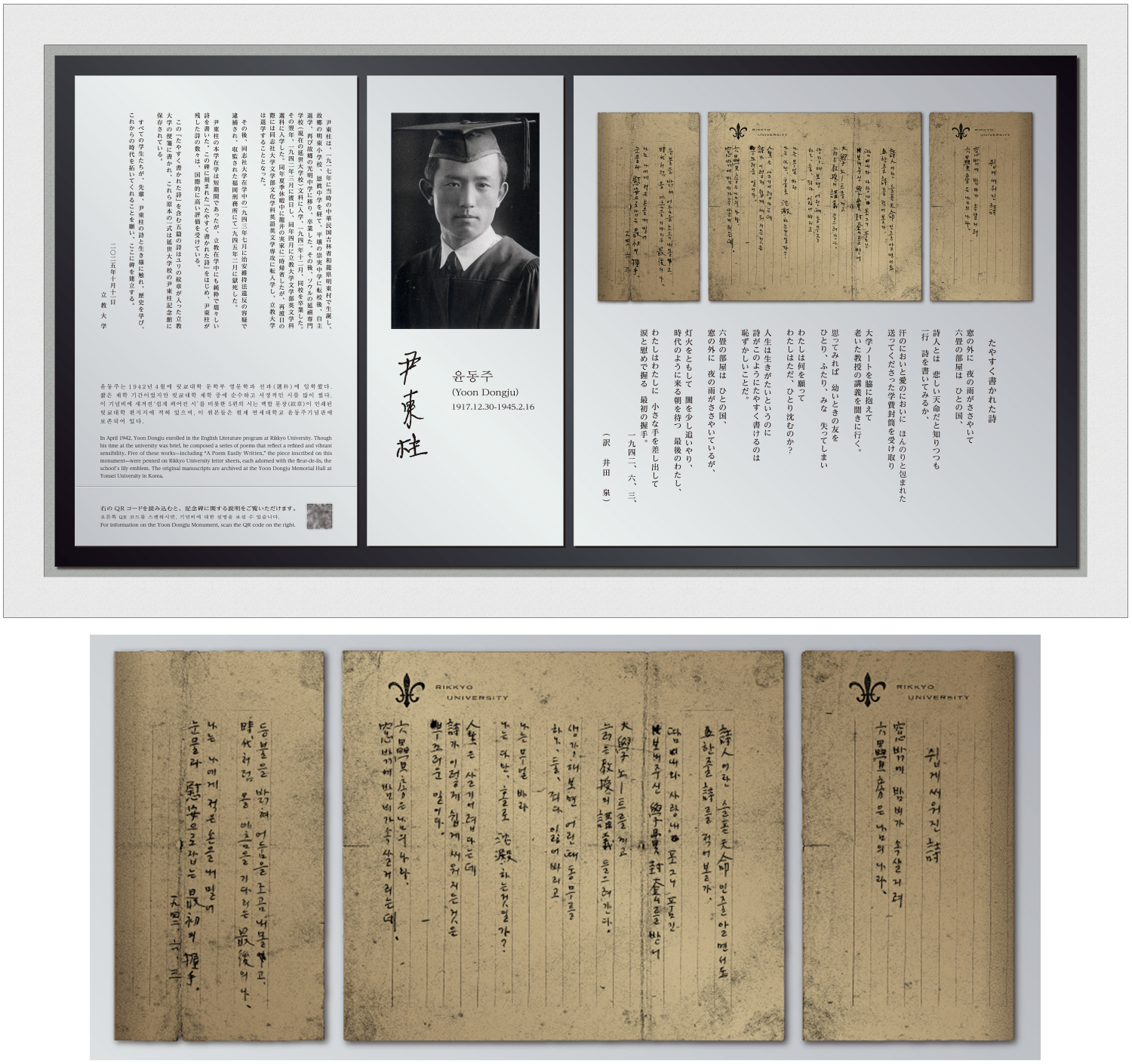Rikkyo University and Yoon Dongju立教大学
1. About Yoon Dongju
The Life of Poet Yoon Dongju

A photo taken during summer vacation when he returned home while attending Rikkyo University. (August 4,1942)
Yoon Dongju (尹東柱), a revered Korean poet, was born in 1917 in Myeongdong Village, North Gando (present-day Yanbian Korean Autonomous Prefecture, Jilin Province, China). His family and the village community were strong adherents of Christianity and proponents of ethnic education.
Yoon Dongju was educated at Christian-affiliated schools, including Myeongdong Elementary School, Eunjin Middle School (Yongjeong), and Sungsil Middle School (Pyongyang). However, in protest against the increasingly severe Japanese colonial policy of compulsory Shinto shrine worship, he withdrew from Sungsil Middle School. After a period at Gwangmyeong Academy Middle School (Yongjeong), he matriculated into the Liberal Arts Department of the Christian-affiliated Yeonhui College (Seoul) in April 1938.
After graduating from Yeonhui College in December 1941, he traveled to Japan the following spring. He enrolled in the English Literature Department (a non-degree program, senka) of the Faculty of Letters at Rikkyo University in April 1942. He returned home for the summer vacation that year (as seen in the photograph taken on August 4, 1942) before transferring in October to the English Language and Literature program (also senka) within the Faculty of Letters at Doshisha University in Kyoto.
Tragically, in July 1943, while studying at Doshisha University, Yoon Dongju was arrested on charges of violating the Peace Preservation Act—a charge often leveraged against those resisting Japanese colonial rule. He was sentenced to two years in prison and died in his cell at Fukuoka Prison on February 16, 1945, just six months before Korea’s liberation.
Yoon Dongju was educated at Christian-affiliated schools, including Myeongdong Elementary School, Eunjin Middle School (Yongjeong), and Sungsil Middle School (Pyongyang). However, in protest against the increasingly severe Japanese colonial policy of compulsory Shinto shrine worship, he withdrew from Sungsil Middle School. After a period at Gwangmyeong Academy Middle School (Yongjeong), he matriculated into the Liberal Arts Department of the Christian-affiliated Yeonhui College (Seoul) in April 1938.
After graduating from Yeonhui College in December 1941, he traveled to Japan the following spring. He enrolled in the English Literature Department (a non-degree program, senka) of the Faculty of Letters at Rikkyo University in April 1942. He returned home for the summer vacation that year (as seen in the photograph taken on August 4, 1942) before transferring in October to the English Language and Literature program (also senka) within the Faculty of Letters at Doshisha University in Kyoto.
Tragically, in July 1943, while studying at Doshisha University, Yoon Dongju was arrested on charges of violating the Peace Preservation Act—a charge often leveraged against those resisting Japanese colonial rule. He was sentenced to two years in prison and died in his cell at Fukuoka Prison on February 16, 1945, just six months before Korea’s liberation.
The Poetic Legacy from Japan
Yun Dongju’s time in Japan yielded a small, precious collection of work. Of the poems he is known to have written during his three years in the country, only five have survived to this day:
“White Shadow” (April 14, 1942)
“Flowing Street” (May 12, 1942)
“Beloved Memories” (May 13, 1942)
“A Poem Written Easily” (June 3, 1942)
“Spring” (Date unknown)
These poems, his last verifiable works, were all written on Rikkyo University letterhead. They intimately capture the feelings and reflections of the young poet during his initial period in Tokyo.
The poems were preserved because they were included in a letter Yun Dongju sent to his close friend in Seoul, Kang Cheojung. Since both the letter and the poems were written in the Korean alphabet (Hangeul)—a risky act under colonial censorship—Kang Cheojung prudently discarded the letter to protect himself, keeping only the poetry. As a result, the manuscript for “Spring,” the final poem in the set, is incomplete, with the ending unfortunately lost to history.
“White Shadow” (April 14, 1942)
“Flowing Street” (May 12, 1942)
“Beloved Memories” (May 13, 1942)
“A Poem Written Easily” (June 3, 1942)
“Spring” (Date unknown)
These poems, his last verifiable works, were all written on Rikkyo University letterhead. They intimately capture the feelings and reflections of the young poet during his initial period in Tokyo.
The poems were preserved because they were included in a letter Yun Dongju sent to his close friend in Seoul, Kang Cheojung. Since both the letter and the poems were written in the Korean alphabet (Hangeul)—a risky act under colonial censorship—Kang Cheojung prudently discarded the letter to protect himself, keeping only the poetry. As a result, the manuscript for “Spring,” the final poem in the set, is incomplete, with the ending unfortunately lost to history.

2. Yoon Dongju Monument


We have recently installed a monument to Yoon Dongju, a nationally renowned Korean poet with strong ties to our university, on the Ikebukuro Campus.
After he died in 1945, Yoon Dongju became widely known in Korea as a lyric poet, national poet, and resistance poet. His worldview and philosophy are highly regarded not only in Korea but also in Japan, China, and other countries worldwide. At his alma mater, Yonsei University in Korea, and at Doshisha University, memorial facilities and monuments have been established to pass on Yun Dongju's aspirations for freedom and peace to future generations, which he sought through poetry.
Our university has also been involved in related initiatives, such as making Yoon Dongju's works available for viewing at the Rikkyo Academy Exhibition Hall and establishing the “Yoon Dong-ju International Exchange Scholarship” for Korean students. However, since I started my second term as president, a series of meaningful circumstances led me to seriously reconsider the establishment of a memorial monument for Yoon Dongju. First, during a visit to Korea in May 2024, I learned from Professor Chang Yoon-jae of Ewha Womans University that Ewha Womans University and Yonsei University (formerly Yonsei College) once shared a chapel (now the Ewha Womans University Chapel), and that Yoon Dongju had attended worship services during his time at Yonsei College. Many people at Ewha Womans University and Yonsei University are aware that Yoon Dongju studied at Rikkyo University, and there is a strong sense of affinity and shared educational philosophy with Rikkyo University. This was a poignant reminder of the enduring connection between universities across national borders, exemplified by the presence of Yoon Dongju.
The other is the conclusion of a partnership agreement with Doshisha University. The agreement with Doshisha University aims to promote cooperation in advancing each other's education and research, based on mutual understanding and respect for each other's founding spirit and educational philosophy. Remembering what Yoon Dongju learned at Rikkyo and disseminating his spirit and legacy widely to students and society is, from many perspectives, such as the desire for lasting world peace, reflection on Japan's history of war, and a commitment to building future-oriented friendly relations in East Asia, a social significance that our university, together with Doshisha, can contribute to the international community, and an educational value for students.
In recent years, I have heard that studies are tracing Yoon Dongju's strong desire to enroll at Rikkyo University and how his talent as a poet was further refined during his time at Rikkyo. By embodying Yoon Dongju's spirit at the Ikebukuro Campus, where he studied, I aim to solidify further our university's position as an outstanding institution with a global perspective. This will also provide a significant advantage for Rikkyo students studying abroad in South Korea in the future. At the 150th anniversary ceremony of our university in 2024, Mr. Lee Jaejoung, former president of the Anglican University, mentioned the relationship between Rikkyo and Yoon Dong-ju in his congratulatory speech. In January 2025, to mark the 80th anniversary of Yoon Dongju's passing, students and faculty members from Yonsei University, who commemorate the spirit of Yoon Dongju, visited our university and had the opportunity to interact with many Rikkyo students.
We are confident that this monument will serve as an indispensable ideological foundation for our university as it develops its Global Liberal Arts & Sciences education. On behalf of the entire Rikkyo University community, we are deeply honored to establish this memorial monument for Yoon Dongju.
After he died in 1945, Yoon Dongju became widely known in Korea as a lyric poet, national poet, and resistance poet. His worldview and philosophy are highly regarded not only in Korea but also in Japan, China, and other countries worldwide. At his alma mater, Yonsei University in Korea, and at Doshisha University, memorial facilities and monuments have been established to pass on Yun Dongju's aspirations for freedom and peace to future generations, which he sought through poetry.
Our university has also been involved in related initiatives, such as making Yoon Dongju's works available for viewing at the Rikkyo Academy Exhibition Hall and establishing the “Yoon Dong-ju International Exchange Scholarship” for Korean students. However, since I started my second term as president, a series of meaningful circumstances led me to seriously reconsider the establishment of a memorial monument for Yoon Dongju. First, during a visit to Korea in May 2024, I learned from Professor Chang Yoon-jae of Ewha Womans University that Ewha Womans University and Yonsei University (formerly Yonsei College) once shared a chapel (now the Ewha Womans University Chapel), and that Yoon Dongju had attended worship services during his time at Yonsei College. Many people at Ewha Womans University and Yonsei University are aware that Yoon Dongju studied at Rikkyo University, and there is a strong sense of affinity and shared educational philosophy with Rikkyo University. This was a poignant reminder of the enduring connection between universities across national borders, exemplified by the presence of Yoon Dongju.
The other is the conclusion of a partnership agreement with Doshisha University. The agreement with Doshisha University aims to promote cooperation in advancing each other's education and research, based on mutual understanding and respect for each other's founding spirit and educational philosophy. Remembering what Yoon Dongju learned at Rikkyo and disseminating his spirit and legacy widely to students and society is, from many perspectives, such as the desire for lasting world peace, reflection on Japan's history of war, and a commitment to building future-oriented friendly relations in East Asia, a social significance that our university, together with Doshisha, can contribute to the international community, and an educational value for students.
In recent years, I have heard that studies are tracing Yoon Dongju's strong desire to enroll at Rikkyo University and how his talent as a poet was further refined during his time at Rikkyo. By embodying Yoon Dongju's spirit at the Ikebukuro Campus, where he studied, I aim to solidify further our university's position as an outstanding institution with a global perspective. This will also provide a significant advantage for Rikkyo students studying abroad in South Korea in the future. At the 150th anniversary ceremony of our university in 2024, Mr. Lee Jaejoung, former president of the Anglican University, mentioned the relationship between Rikkyo and Yoon Dong-ju in his congratulatory speech. In January 2025, to mark the 80th anniversary of Yoon Dongju's passing, students and faculty members from Yonsei University, who commemorate the spirit of Yoon Dongju, visited our university and had the opportunity to interact with many Rikkyo students.
We are confident that this monument will serve as an indispensable ideological foundation for our university as it develops its Global Liberal Arts & Sciences education. On behalf of the entire Rikkyo University community, we are deeply honored to establish this memorial monument for Yoon Dongju.
October 11, 2025
The Rt Revd Dr Renta Nishihara
President of Rikkyo University
Yoon Dongju was born in 1917 in Myeongdong Village, Hwaryong County, Jilin Province, Republic of China. He attended Myeongdong Elementary School and Eunjin Middle School in his hometown, then transferred to Chongshil Middle School in Pyongyang, where he withdrew voluntarily. He then moved to Gwangmyung Middle School in his hometown, where he completed his education. He then enrolled in the Liberal Arts Department of Yeonhee Specialized School (now Yonsei University) in Seoul, graduating in December 1941. The following year, in March 1942, he traveled to Japan. Yoon Dongju enrolled in the English Literature program at Rikkyo University in April of the same year. During the summer vacation of the same year, he temporarily returned to his parents' home in Ryongjin. However, upon returning to Japan, he transferred to the English Literature Department of the Faculty of Literature at Doshisha University and withdrew from Rikkyo University.
While attending Doshisha University, he was arrested in July 1943 on suspicion of violating the Peace Preservation Law. He died in prison in February 1945 while incarcerated at Fukuoka Prison.
Though his time at the university was brief, he composed a series of poems that reflect a refined and vibrant sensibility. Among the poems he left behind, including “A Poem Easily Written” inscribed on this monument, many have received international acclaim.
Five of these works—including “A Poem Easily Written”—were penned on Rikkyo University letter sheets, each adorned with the fleur-de-lis, the school’s lily emblem. The original manuscripts are archived at the Yoon Dongju Memorial Hall at Yonsei University in Korea.
We, Rikkyo University, hereby erect this monument in the hope that all students will learn about history through the poetry and life of their senior, Yoon Dongju, and help pave the way for the future.
While attending Doshisha University, he was arrested in July 1943 on suspicion of violating the Peace Preservation Law. He died in prison in February 1945 while incarcerated at Fukuoka Prison.
Though his time at the university was brief, he composed a series of poems that reflect a refined and vibrant sensibility. Among the poems he left behind, including “A Poem Easily Written” inscribed on this monument, many have received international acclaim.
Five of these works—including “A Poem Easily Written”—were penned on Rikkyo University letter sheets, each adorned with the fleur-de-lis, the school’s lily emblem. The original manuscripts are archived at the Yoon Dongju Memorial Hall at Yonsei University in Korea.
We, Rikkyo University, hereby erect this monument in the hope that all students will learn about history through the poetry and life of their senior, Yoon Dongju, and help pave the way for the future.
October 11, 2025
Rikkyo University
Monument Location and Notes
- Location: 3-34-1, Nishi-Ikebukuro, Toshima-ku, Tokyo (Rikkyo University)
- For access to the Ikebukuro Campus, please refer to this information.
- Please take public transportation as there is no parking available on campus.
